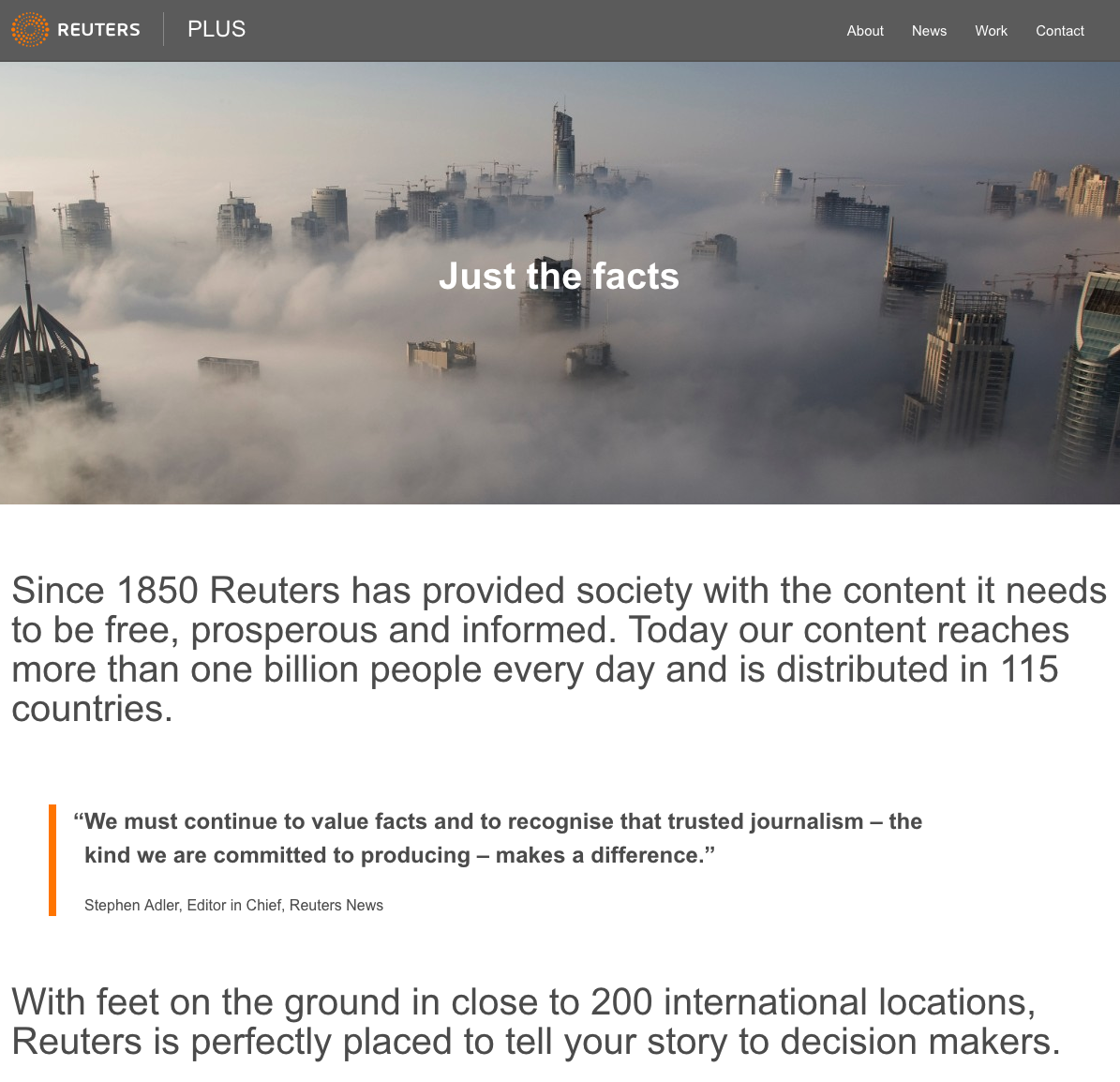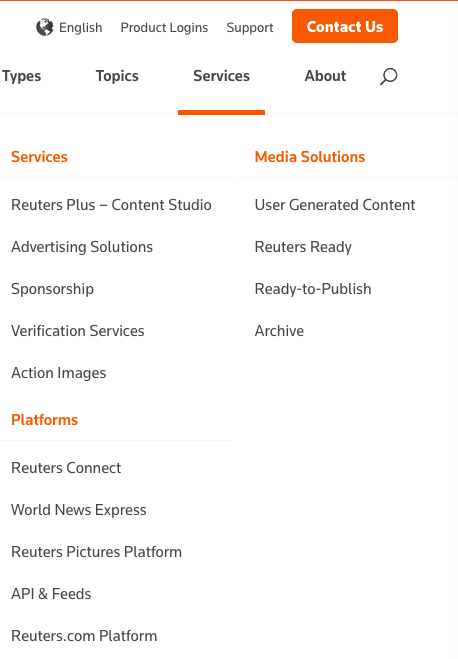Sponsored content on big media name platforms is not what you think it is.

Increasingly, companies are paying well-known journalism brands to produce and host sponsored content. The deal is this: you pay a big name media platform to write something nice about you and they put it on their website. If you squint you may see your puff piece alongside, or at least near, some of the big name media platform’s own content, created by their own journalists. You pay for the privilege, but (still squinting) what’s not to like? A big win, right?
Up to a point, Lord Copper.
I’ve spent time in both parts of this business — as a journalist for some of the top media brands in the world — Dow Jones, Thomson Reuters, the BBC — and as a consultant to companies putting sponsored content on these platforms, and I have concluded that, for my clients, this is not the best way to spend their money. Why?
I see two problems:
- Poor ideation of content. In a real newsroom, there’s a process to decide what the story is — what is going to be written. An editor or two will weigh in; the reporter will likely have to write a pitch in order to demonstrate the story is going to be a good one. The process is not necessarily adversarial, but it might be, because the parties are aligned to ensure the end product is as good as possible. The editor doesn’t want to commission a dud; the journalist wants to create a story that wins awards. When the content is sponsored, there are no such calibrated alignments. Once the platform has your money, they don’t really care what the content is. For sure, there’s some negotiation prior to the signing of a contract, but no-one with any real skill and experience in good journalism is in the discussion, asking the tough questions: is this a good story? Will someone want to read it? Aren’t we just saying what everyone expects us to say? The result is usually at best a bland story, at worst, a cringe-fest.
- Poor understanding about what is actually being sold. What am I actually getting for my money? Big media platforms essentially perform a kind of bait-and-switch in that they make it sound like the client is buying at least two things: access to the platform’s top-notch journalists, and placement of the content alongside the platform’s original, real journalism.
Let’s look at how this works in practice. Take Reuters, for example. (Declared interest: I worked at Reuters as a journalist from 1988-1997 and from 2012-2018, and it’s home to some of the best journalists in the world.)
Just the facts, ma’am

In Reuters’ case a separate marketing team was set up in 2017, and a service launched called Reuters Plus. In June 2018, the wording of the about page was as follows:
Just the facts
Since 1850 Reuters has provided society with the content it needs to be free, prosperous and informed. Today our content reaches more than one billion people every day and is distributed in 115 countries.
“We must continue to value facts and to recognise that trusted journalism – the kind we are committed to producing – makes a difference.” Stephen Adler, Editor in Chief, Reuters News
With feet on the ground in close to 200 international locations, Reuters is perfectly placed to tell your story to decision makers.
If I was a company looking to get my content on Reuters I might be forgiven for thinking this would be the way to do it. At the time Adler was the most senior practising journalist in Reuters, and the wording suggests strongly that Adler and his team of journalists would be involved in the process of telling the client’s “story to decision makers.”
To be fair, when it was pointed out to Reuters’ management that Adler’s name was being used in this way, the page was removed.
But the way these services are presented now is not a whole lot better. The website is now more deeply fused into the Reuters Agency website (which is the commercial part of Reuters selling content to media etc) and the service can be accessed from a menu alongside Reuters commercial editorial products (i.e., actual journalism).

The page itself states the following. I’ve italicised the areas where two separate elements are conflated — real Reuters journalism and content created for and paid for by a client:
The world listens to Reuters. That’s why when we tell stories for our partners – with a steadfast commitment to excellence, accuracy, and relevance – we create impact and provoke powerful responses.
Reuters content studio builds campaign content that helps you to connect with your audiences in meaningful and hyper-targeted ways. From full-service content creation to editorial event sponsorships, coupled with our unique content distribution capabilities, we tell your stories in a way that audiences have relied on for 170 years.
Elevate your campaigns with Reuters quality: Covering everything from written articles, videography, broadcast content, photography and events, our multifaceted approach to content creation is rooted in award-winning expertise and a commitment to the heritage of storytelling.
We combine inventive content creation with the science of data-driven strategy to make your stories work seamlessly across our premium platforms and social media channels and engage the right audiences.
Benefit from the power of Reuters: Reuters has always stood for trust and integrity, and we remain the world’s preferred source for news and insights across evolving platforms, channels, and media.
Our unrivaled insights into the big picture – globally and regionally – and the finest details across every industry and agenda, ensure that every story we tell is accurate, up to date, and sought after by audiences worldwide.
That’s why when Reuters tells your story, you can be sure that it will reach the right calibre of audience and provoke the response you need.
In fact, I felt that the lines between Reuters Plus (now called a “content studio”) and the journalism part of Reuters were even more blurry. Not one sentence in the above blurb is designed to clarify that the content being produced by Reuters Plus is entirely separate to Reuters’ journalistic content. Even the terms get blurred: The word ‘partners’ was used to describe customers both of editorial content (journalism) and sponsored content (not journalism as journalists know it). It has also added other services to the mix that further blur the lines. Under a page called ‘sponsorship’ other services are offered, including event sponsorship and ‘editorial franchises’. (Sponsored content has also now been quietly renamed “sponsored articles”. )
Trust me, I’m a journalist, sort of
In short, I noticed no attempt to disabuse the customer of any belief that they were in essence paying for a Reuters journalist to write a positive story about their company/institution/government and pushed to all Reuters’ media customers and channels alongside Reuters’ real journalism.
And this is in essence the bait-and-switch taking place. I’m not suggesting Reuters is the sole culprit here; nearly every major mainstream media platform does this, but as a consultant my interest lies primarily with the client, and I feel there’s a lack of understanding (some say a wilful lack of understanding) of what is really happening here.
Trust me: no Reuters journalist, editor, writer, reporter, whatever, will be involved in helping you find a compelling angle for your content. The writing will likely be farmed out to a freelancer, or an in-house writer (here’s a recent ad from Reuters Plus for a ‘custom content writer’; notice the requirement does not prioritise journalistic experience as much as branded content: Candidates should have Have 5+ years experience in branded content writing or journalism. The kicker: one of the perks of the job, the ad proclaims, is the chance to
Work alongside Pulitzer Prize-winning journalists and a team who provide unmatched, award-winning coverage of the world’s most important stories
If working alongside means (possibly) being in the same building, then I guess that is a perk. In my experience there is zero contact between the marketing teams involved in the production of sponsored content and the (real) editorial teams in Reuters, or elsewhere. And that’s how it should be: journalists should not be aware of any commercial or other relationships between the company they work for and the companies, governments and individuals they write about. Implying there is only damages the editorial function.
Journalism for most of these traditional platforms (WSJ, NYT, BBC, AP, Reuters etc) is not particularly lucrative, and it was probably inevitable that they would have to rent out their most valuable asset — their masthead — to generate some cash. The problem is this: most of it is done without the knowledge or approval of the journalists working for that masthead, and things go wrong when they do. Reuters has gone through quite a few about-turns when journalists get wind of these rentals, like this one, in 2014. Understandable: at best these rent-outs undermine journalism because it not only dilutes the brand, but encourages companies to think, “I don’t need to talk to the journalists who ask difficult questions; I can just buy some space and say what I want.”
And that’s the rub. Companies have allowed themselves to be misled into thinking this content they’re paying for is
a) going to appear alongside the platform’s own content, and to be largely indistinguishable from it and
b) somehow their content will be as widely read as the platform’s own content.
Neither is likely to be true. If you’re relying on a marketing team and a content-writer to come up with something as snazzy as a piece of real journalism, you’re overestimating interest in your product/company and underestimating the effort put into real journalism.
Reality and Obscurity
So my advice — and once again, I’m declaring an interest in trying to rethink content produced by companies and institutions, so of course I would say this — is to think hard before committing funds to sponsored content in channels like these. There are some which work hard to deliver quality content, but never at any point in my experience as a consultant has the process come close to matching the rigour and effort involved in real newsrooms to ensure the content is really, really good, and is compelling enough to stand alongside original journalism.
Because that’s what is being sold here: the notion that your content will be as compelling as the rest of the content on the platform, because it’s gone through similar processes which will ensure it’s as widely read — and trusted — as that other content.
The reality is that in most instances this is simply not the case.
So what’s the answer? I’ll go into some case studies of alternatives in future columns, but for now, here’s a checklist when you’re considering commissioning sponsored content:
- go in with a clear idea of what you’re really getting for your money. Don’t think in terms of trying to promote some grand vision or new product line; think in terms of what might be of interest to a reader: What would capture their attention, and provide real, original insight?
- demand to have handling your content someone who is experienced in real journalism, and encourage them to speak their mind. Let them guide you in determining angles, because their instinct about what people want to read will be your biggest asset;
- demand to know who will be writing the content, and demand that person be an experienced (real) journalist;
- keep the channels free of any input from marketing or other spin. Resist the urge to add specific product mentions or jargon; Don’t tweak the text just for the sake of it; respect the writer’s knowledge about what works and what doesn’t;
- be proud of what you’ve done, but done be under any illusions that this somehow replaces being open to real journalists who want to talk to you. Sponsored content is not an alternative to a well-staffed and experienced PR function; if it’s good, the content should spark greater interest among journalists in what you have to say.